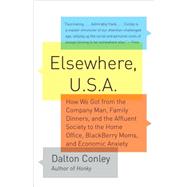The division between work and home has been all but demolished, replaced by a weightless, wireless economy that encourages work at the expense of leisure. Conley, a preeminent social scientist, provides an X-ray view of the nation's new social reality.
Over the past three decades, our daily lives have changed slowly but dramatically. Boundaries between leisure and work, public space and private space, and home and office have blurred and become permeable. In Elsewhere, U.S.A., acclaimed sociologist Dalton Conley connects our day-to-day experiences with occasionally overlooked sociological changes, from women’s increasing participation in the labor force to rising economic inequality among successful professionals. In doing so, he provides us with an X-ray view of our new social reality.








